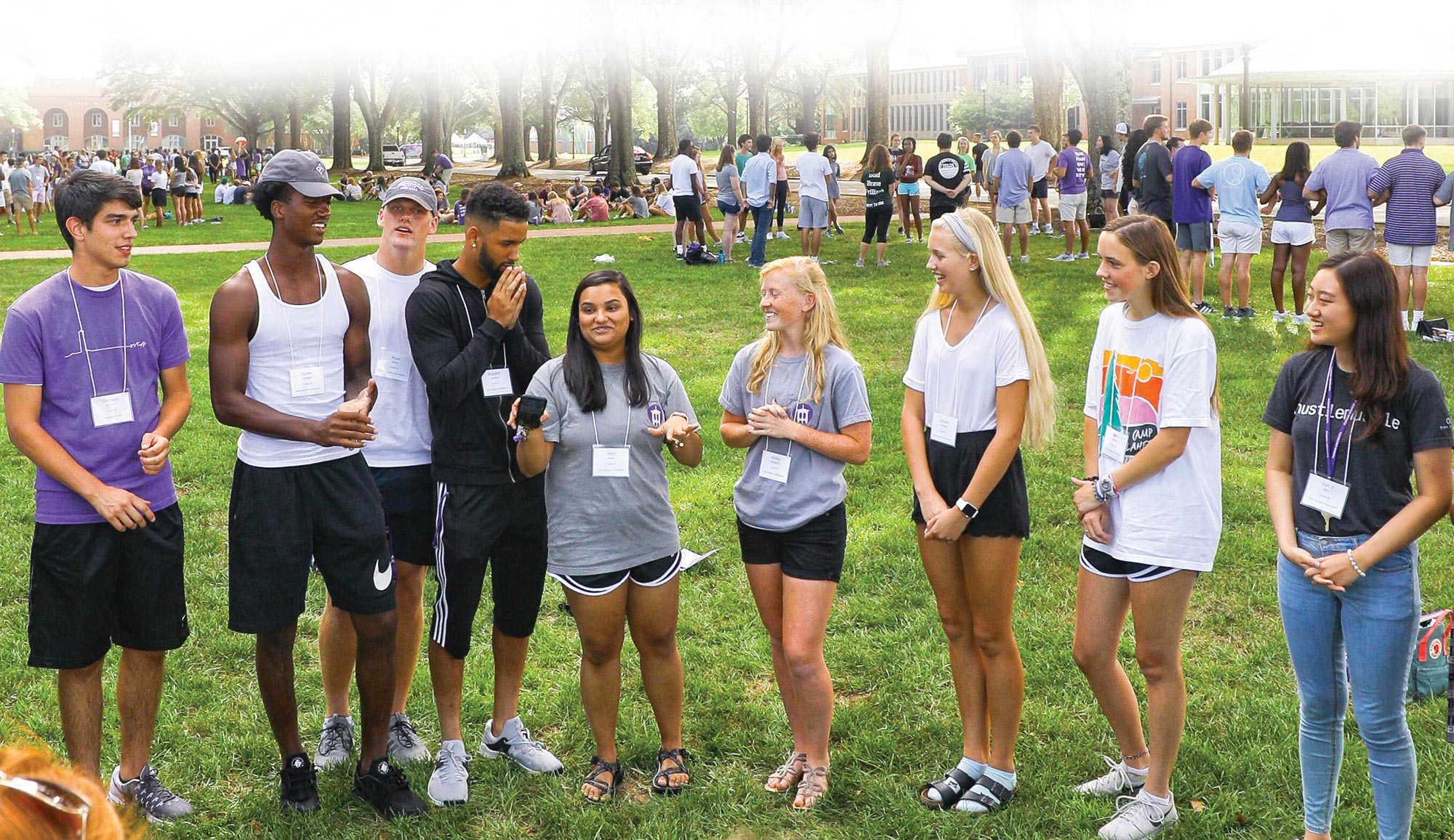EDUCATED
CITIZENRY
assistant professor
of health science, with
Jackie Hirons '20 in Plyler Hall.
Throughout history, the liberal arts and sciences were dedicated to developing an educated citizenry for the betterment of society. As our institutions opened their doors beyond a privileged subset of individuals, that mission evolved and strengthened. Underrepresented voices and ideas challenged previously unexamined notions of societal progress. And our educated citizenry began to reflect and equitably engage in their communities. Accordingly, diversity became the engine that allowed liberal arts and sciences to not only be relevant in the current age but also to excel in its mission
A culture of belonging
This past year, Furman undertook efforts to understand who it historically privileged at the expense of others and how we can remove barriers to access and achievement.
Since launching The Furman Advantage in 2016, Furman has adapted its critical analysis of the student experience to better deliver on its promise. The conversation pushed Furman to the forefront of universities talking about student belonging. We developed a strategic plan to match a servant heart with a knowledge of privilege, community engagement and leadership to allow our students to build coalitions of citizens willing to work toward equitable social change across the spectrums of economics, race, political affiliation, religion, ability, sexuality, regionalism, gender identity and more.
Out of this plan came the launch of the Center for Inclusive Communities in 2017. Its two goals are to enhance student flourishing by supporting the immediate and long-term success of Furman’s historically underrepresented students, using current research on belonging, well-being and career engagement; and to develop engaged citizens by making real the citizenship promise of a liberal arts and sciences education, graduating students who appreciate difference, value community and are prepared to make a lasting impact.
Faculty, students and staff worked to translate hallmark programs at state public flagships to the liberal arts and sciences experience. The result launched academic courses and co-curricular workshops that bring individuals who have historically been at odds together to dialogue across their differences. We have celebrated heritage months to encourage students to explore their identities and invite others to learn from friends. We connected students desiring to do service during school breaks with faculty and community partners who could help them both understand why such social issues permeate and to reflect on how their experience influenced their individualized pathways.
A community of mentors
Each year, new students arrive at Furman. They are not only new to our community, but new in their life experiences, in the style of parenting they received, and in the diverse composition of those they lived, learned and played with in the years preceding college. Our students should be met each year by faculty who not only reflect academic achievement through the degrees they’ve earned, but also by the lives they’ve lived along the journey. Whether a student is the first in their family to go to college or a third-generation Paladin, a student of color or a white student, a Christian student or one who professes a different faith or no faith at all, an LGBT+ student, a rural student or of any other myriad of lived experiences, they look to find a mentor who models that the college transition can bloom into a life well-lived. And more often than not, students seek a mentor who has a common connection to that transition.
It is why a 10:1 student-to-faculty ratio is so critical to Furman’s educational success. In 2016-17, we hired 13 tenure-track faculty, 11 of whom increased our diversity. In 2017-18, we hired 19 tenure-track faculty; 14 were diverse hires. Using an open-rank search similar to the strategies employed by search firms seeking out top talent, we hired two full professors and four associate professors.
Baseline in July 2016 for
the 2016-17 academic year:
• 35% FEMALE FACULTY
• 11.7% FACULTY OF COLOR
Estimate for the 2019-20
academic year:
• 42% FEMALE FACULTY
• 16.5% FACULTY OF COLOR
In 2019-20 we will have 237
faculty (235 in 2015-16):
• 99 FEMALE FACULTY
• 39 FACULTY OF COLOR
“Furman challenges you to be the best version of yourself — to venture out of your comfort zone, delve into experiences in and outside of the classroom, and really grow as a person.”
— RISH AGARWAL ’19, INDIA
Graduate Student at the Wake Forest School of Business
India, majored in mathematics and
economics at Furman and is now
pursuing a Master of Science in
business analytics at Wake Forest.
BEST
VERSION OF
YOURSELF
Task Force on
Slavery and Justice
With the support of the Board of Trustees and the president and provost, the Task Force on Slavery and Justice was formed in the spring of 2017 to examine Furman University’s historical connections to slavery and to help Furman better understand and learn from its past. This pursuit

Furman will create a statue to honor Joseph Vaughn (above), the university’s first African-American student.
built upon Furman’s principles as an academic institution that embraces liberal arts and sciences ideals, including a high regard for human value, reflection, innovation and ceaseless accuracy. The process was guided by scholarship and undergraduate research in communication studies, history, sociology and sustainability, among other departments, and led by students, faculty, staff and alumni.
We cannot change history, but we can show in real and meaningful ways that we are true champions of a more inclusive future.
In October 2018, the Board of Trustees accepted the task force report, “Seeking Abraham,” endorsed expanding the Joseph Vaughn Scholarship to a $1 million annual award, and designated $3 million in endowment to ensure it is offered in perpetuity, and they encouraged the administration and faculty to move forward in considering the report’s other recommendations not under the board’s purview, including curriculum and co-curricular activities and programming.
In May 2019, the university announced that the board unanimously approved additional recommendations, including removing the name of the university’s first president, James C. Furman, from the building located at the heart of campus, and renaming it Furman Hall, in honor and celebration of the entire Furman family and all of the students, faculty, staff and alumni who have contributed to the history of the university. Read the “Seeking Abraham” report to learn more about the approved recommendations at furman.edu/tfsj.
The pace of growth
Students’ maturation from adolescence to adulthood requires scaffolded challenges and timely support. Without academic and social challenges, students fail to grow. However, too much challenge without support may be overwhelming. Furman professors and staff understand that determining when to push and when to intervene is as complex as each student’s individualized path.
Holistic well-being
Based on data from Furman’s four-year resiliency study funded by The Duke Endowment, support groups were launched for students dealing with sexual trauma, the loss of loved ones, and anxiety and stress. Additionally, Furman recently hired three professionals of color into senior roles at our counseling and health centers and added groups that provide space for students to explore their transgender identity as well as black identity.
Education
In concert with the Associated Colleges of the South, Furman professors developed inclusive pedagogy workshops that trained nearly a quarter of our faculty. Safe Zone trainings prepared professors and practitioners to support LGBT+ students. The Pathways Advising Program, a first- and second-year advising model, welcomed a second cohort of students to participate in a curriculum specifically designed around the challenges identified by Furman’s four-year resiliency study, with a result that students reported a greater sense of belonging and support at Furman as compared to their peers.
Finally, Furman’s university-wide effort to support students who are first in their family to attend college was recognized by naming Furman a “First Forward” campus in an inaugural cohort of institutions across the country, 16 of which were among the top 50 in U.S. News and World Report-ranked schools.
Extending the promise
International recruitment remains a top priority for the university, as we continue to elevate the exposure and reputation of Furman around the world. These students bring not only a diversity of thought and a greater understanding of other cultures but also enable other students to learn firsthand about global issues.
We also:
• Focused recruiting efforts in Asia (China, India and Japan), Southeast Asia (Singapore, Taiwan, Thailand, Vietnam and Korea) and South America (Brazil, Colombia and Chile).
• Participated in private college fairs, presentations, workshops, case studies and small- group travel.
• Hosted workshops and webinars through EducationUSA Advising Centers.
• Partnered with Sichuan University in Chengdu, China, and five high schools in Mexico to increase scholarship offerings.
• Brought the AGAPE English Language Institute to Furman to support English proficiency for incoming international students.
• Collaborated with 17 United World Colleges high schools to expand recruitment.

